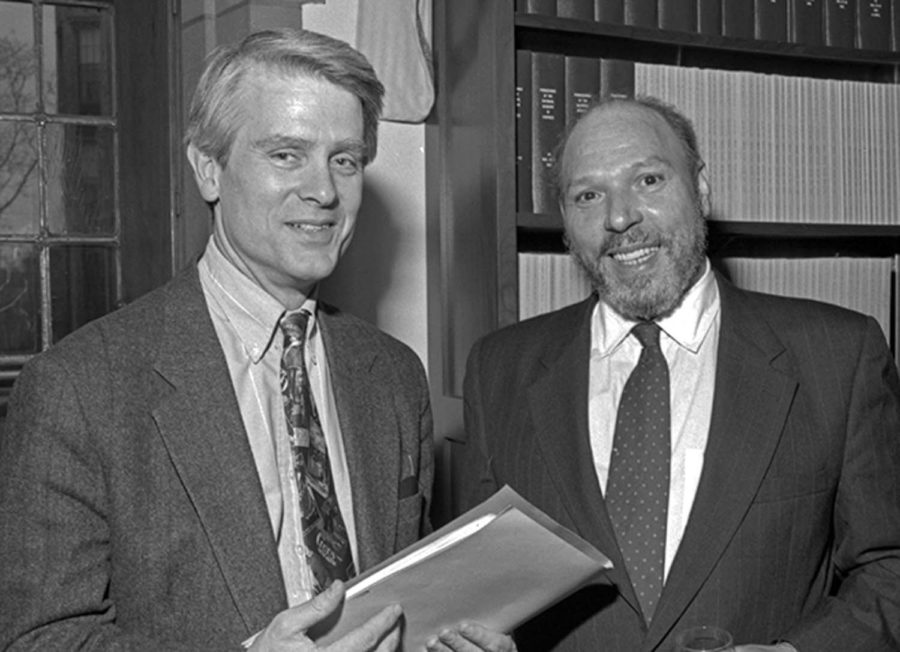Pitt publishes open-access August Wilson Journal
Image via University of Pittsburgh
Christopher Rawson (left) wrote two articles in the first volume of the Pitt-published journal devoted to playwright August Wilson (right).
October 28, 2019
When Pitt published the first volume of the first scholarly journal on famed Pittsburgh playwright August Wilson in June, the creators felt it was important that the journal be free for anyone to access.
Michael Downing, an August Wilson scholar from Kutztown University of Pennsylvania and the editor of the new August Wilson Journal, said a paywall would have felt unethical.
“[Wilson] would want it open-access,” Downing said. “He would want people who don’t necessarily have the money to be able to pay a subscription or do anything like that to be able to log on to a website and access this scholarship.”
Downing began the project in 2002 as an independent blog. Over the 10 years that Downing updated the blog, he aggregated more than 400 scholarly articles on Wilson that he found on the internet.
Now Downing is involved with writing and publishing those scholarly articles. The first volume of the August Wilson Journal, including exclusive content, such as an interview with Wilson’s widow Constanza Romero, was published electronically as an open-access journal by Pitt this past June. The second volume will be published on a rolling basis and collected into a completed volume next June, Downing said.
David Anderson, of Butler County Community College, is the journal’s managing editor, after having worked with Downing for years on the blog. In the process of making the journal, Anderson said, the team of editors had to ask themselves what Wilson himself would have wanted in terms of the journal’s accessibility.
“Wilson was self-educated,” Anderson said. “He dropped out of high school and he educated himself by going to the library. So, the idea of charging a subscription price for his journal just seemed really inappropriate.”
Downing said his passion for this project comes from a respect for Wilson’s work and the need to preserve the legacy of one of the country’s foremost playwrights.
“August Wilson has been named, on more than one occasion, ‘America’s Shakespeare,’” Downing said. “Therefore, it is important for his legacy to be preserved. He deserves a place right alongside Arthur Miller, Tennessee Williams and other great American playwrights.”
Wilson was born in the City’s Hill District neighborhood in 1945. He created the famous “Pittsburgh Cycle,” a collection of 10 plays set in the Hill District, all 10 of which were shown on Broadway. It is also called the “Century Cycle,” with each play taking place in one particular decade of the 20th century. Wilson died in 2005.
Two of the cycle’s plays, “Fences” and “The Piano Lesson,” won Pulitzer Prizes for Drama in 1987 and 1990, respectively. “Fences” also won a Tony Award for Best Play in 1987, and was adapted as a film in 2016 starring Denzel Washington and Viola Davis. Washington himself spent the summer in Pittsburgh producing a film adaptation of Wilson’s 1982 play “Ma Rainey’s Black Bottom” for Netflix.
Downing approached Pennsylvania State University with the idea of a scholarly journal in 2015, but was turned down due to the university’s policy of restricting journal publications to those produced by university faculty, he said. He brought the idea next to Pitt’s University Library System that same year.
The journal’s electronic publications manager and ULS liaison, Vanessa Gabler, said it was important to all of those involved that the journal be an accessible resource to everyone. The University will provide the Wilson journal alongside its other open-access archives like the Cinema Journal and Hungarian Cultural Studies.
“The ULS E-Journal Publishing Program publishes scholarly Open Access journals as part of its mission to help research communities share knowledge and ideas through open and responsible collaboration and promote Open Access to scholarly research,” Gabler said in an email.
Downing said he is proud of the journal’s progressive accessibility standards, as he believes it to be the future of scholarly writing. He said that he is also proud of the journal’s expansion outside of only publishing scholarly articles.
“In addition to scholars, I would add study, teaching and performance,” Downing said. “We want material on who is teaching August Wilson, how are they teaching. Any kind of teachers, from university to high school teachers to workshops at various theaters across the United States and around the world.”
According to Downing, one of the journal’s goals is to build into the area of multimedia. The interview with Romero that the journal included in its first volume was published both as text and audio.
One of the scholars that contributed to the journal is Christopher Rawson, an emeritus professor in Pitt’s English department. Rawson said he came to know Wilson personally while covering Wilson’s plays as a senior theater critic for the Pittsburgh Post-Gazette.
In addition to his work with the journal, Rawson is the secretary-treasurer of the August Wilson House, a project that is working to renovate Wilson’s childhood home in the Hill District and turn it into an arts center. For the first volume, Rawson wrote about the grant presented to theaters that have performed all 10 of the plays in Wilson’s “Pittsburgh Cycle,” along with a “status update” on the Wilson house.
Rawson said he thought it was important for the journal to be produced in Pittsburgh because Wilson chronicled stories about his experiences in the City.
“He always wrote about Pittsburgh,” Rawson said. “They tell August’s version of stories that he heard on the streets of the Hill District. The people in his plays are built out of people he knew in the Hill District. He is the quintessential Pittsburgh artist.”
According to Rawson, Wilson’s importance to the City is something that is finally being recognized, and he is happy to be part of that.
“Educating Pittsburghers about August Wilson is not only a duty, it’s a pleasure,” Rawson said.



